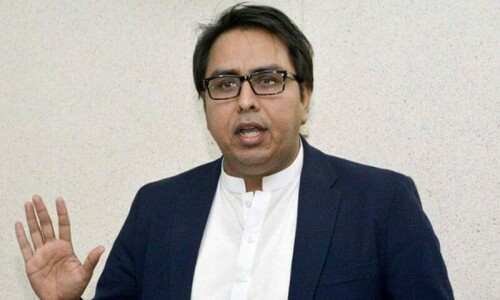LAHORE: We have just seen a prime minister disqualified for drawing a salary by holding an office other than that of the chief executive of the country. On the other hand the salary that is fixed for a prime minister here would suggest that we are either looking for a person who can make do with a monthly take-home amount that is much lower than even his cabinet colleagues or alternatively we aspire to have a chief executive who is free from the burdens of earning a living in the increasingly competitive world.
How much does the prime minister of Pakistan take home at the end of every month? It would come as a surprise to many that the country’s chief executive’s pay is just a fraction of the sum made by a president of a commercial bank or CEO (chief executive officer) or an executive of a multinational or local company. In fact, it is much lower than the salary of parliamentarians and members of his own cabinet.
According to stock analysts, presidents of banks are the most handsomely rewarded lot in the country like elsewhere in the world. CEOs and top executives at multinational firms and large domestic companies also have little to complain about and a lot of dough to throw around.
For financial year 2015, for example, the president of United Bank Limited earned Rs127 million and GlaxoSmithKline Pakistan paid Rs54m to its CEO in 2014. Even chief executives of public sector enterprises get seven-digit salaries with other perks and privileges.
You would say that is altogether a different world. Nowhere around the globe can the dream corporate sector be compared with any other, least of all with areas that boast about serving the people selflessly. Wait till you hear the comparisons within. The chief executive of the country cuts an under-privileged figure when weighed against the paycheck regularly handed to members of his own cabinet, parliamentarians, judges and other senior officials.
The prime minister’s monthly take-home after-tax including all allowances stands at just Rs140,000. Whatever popular chants would declare that even this was often not fully earned, place the figure against a senator’s Rs400,000, MNA’s Rs350,000, federal minister’s Rs235,000 and, state minister’s Rs215,000. The salary of a Supreme Court judge is Rs900,000 plus allowances.
And it is not that the package is only meant for a temporary incumbent asked to look after the prime minister’s office until the real, rightful rulers take charge. The salary, of course, is the same for a heavy-mandated Nawaz Sharif or a Shahid Khaqan Abbasi who is a compromise brought about by circumstances.
It seems that the salary structure of public representatives has no rational basis or logic. “A prime minister who has to rely only on his or her pay cannot make ends meet with this kind of salary,” says a federal government official. “Or have we decided that this job is only for the rich?”
In sharp contrast to Pakistan, India’s prime minister gets Rs3m a month, including hefty allowances. Even, the president of Maldives gets Rs0.78m a month.
“In private sector, the pay of an employee from the lowest to the highest level is determined on the basis of several factors, including educational qualifications, nature of job, performance on the job, reputation, experience, etc,” said the chief financial officer of a company. “For example, an MBA from LUMS is sure to get a better salary than an MBA from Punjab University.”
“Besides, each company – banking or non-banking – in the organised private sector has its own salary/allowances structure depending on their size, market share and repute.”
A financial analyst at a brokerage house remarked in a lighter tone that if the salaries of our parliamentarians, ministers and prime ministers are linked to their performance, they may end up going home empty-handed at the end of every month.
“But on a serious note I agree that the chief executive of the country must get paid according to his status and the demands of his office regardless of other perks that come with his job. At present the prime minister is getting peanuts in the name of salary. I think the head of the state should be the highest paid person followed by the chief executive of the country, who is responsible for running the affairs of the country. It is not about who is holding the job; it is about respect we accord to these highest offices. Can you imagine someone reporting to the president of a bank or CEO of a company - local or multinational - and taking home a heftier paycheck than their boss? Never.”
Published in Dawn, September 10th, 2017












































